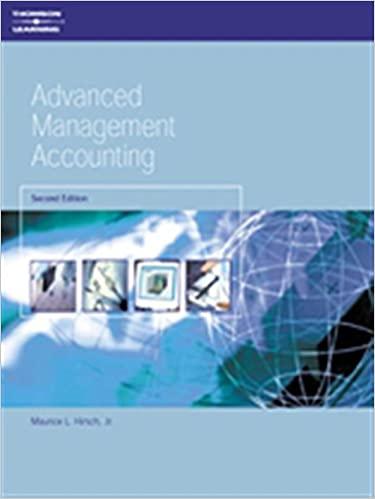Question
Case 8-1 Carlos Sanguine Winery Carlos Sanguine Inc. makes premium wines and table wines. Grapes are crushed and the free-flowing juice and the first-processing juice
Case 8-1 Carlos Sanguine Winery
Carlos Sanguine Inc. makes premium wines and table wines. Grapes are crushed and the free-flowing juice and the first-processing juice are made into premium wines. The second- and third-processing juices are made into table wines.
Table 1 summarizes operations for the year, and Table 2 breaks down manufacturing overhead expenses into general winery costs and production facilities costs.
TABLE 1 Summary of Operations for the Year
| Tons of Grapes | 10,000 | |
| Average Cost per Ton | $190 | |
| Premium Wines | Table Wines | |
| Number of cases produced and sold | 400,000 | 70,000 |
| Selling price per case | $11.00 | $7.00 |
| Revenues | $4,400,000 | $490,000 |
| Grape Costs | 1,650,000 | 250,000 |
| Packaging Costs | 1,000,000 | 140,000 |
| Labor | 200,000 | 35,000 |
| Selling and distributing | 400,000 | 35,000 |
| Manufacturing OH | 400,000 | 87,500 |
| Operating Profit (loss) | $750,000 | ($57,500) |
*Grape costs represent the cost of the juice placed into the two product categories and are calculated as
NOTE: A greater quantity of juice is required per case of premium wine than per case of table wine because there is more shrinkage in the premium wines.
Each product has its own selling and distribution organization. Two-thirds of S&D expenditures vary with cases produced; the remainder of the expenditures do not vary with output.
TABLE 2 Manufacturing Overhead by Products
| Premium Wines | Table Wines | Total | |
| General Winery Costs | $212,800 | $37,200 | $250,000 |
| Production facilities cost (depreciation and maintenance) | 187,200 | 50,300 | 237,500 |
| Manufacturing Overhead | 400,000 | 87,500 | 487,500 |
*General winery costs do not vary with the number of cases or the number of product lines and are allocated based on cases produced.
Premium and table wines have separate production facilities. One-fourth of each of their production facilities costs varies with cases produced. The remainder are fixed costs previously incurred to provide the production capacity.
Based on Tables 1 and 2, the accounting department prepared the report in Table 3.
TABLE 3 Product Line Cost Structure per Case
Management is concerned that the table wines have such a low margin. Some of the managers urge that these lines be dropped. Competition keeps the price down to $7 per case, which causes some managers to question how the competition could afford to sell the wine at this price.
Before making a final decision, top management asked for an analysis of the fixed and variable costs by product line and their break-even points. When management saw Table 4, the president page 379page 380remarked, Well, this is the final nail in the coffin. Wed have to almost triple our sales of table wines just to break even. But we dont have that kind of capacity. Wed have to buy new tanks, thereby driving up our fixed costs and break-even points. This looks like a vicious circle. By next month, I want a detailed set of plans on what itll cost us to shut down our table wines. Table 5 summarizes the shutdown effects.
TABLE 4 Fixed and Variable Costs per Product and Product Break-Even Points
TABLE 5 Effects of Discontinuing Table Wines
- No effect on the sale of premium wines is expected.
- The juice being used in the table wines can be sold to bulk purchasers to use in fruit juices for $150,000 per year.
- The table wine production facilities (tanks, refrigeration units, etc.) have no use in premium wine production. These can be sold for $350,000, net of disposal costs.
Based on the facts presented in the case, what should management do?
Step by Step Solution
There are 3 Steps involved in it
Step: 1

Get Instant Access to Expert-Tailored Solutions
See step-by-step solutions with expert insights and AI powered tools for academic success
Step: 2

Step: 3

Ace Your Homework with AI
Get the answers you need in no time with our AI-driven, step-by-step assistance
Get Started


